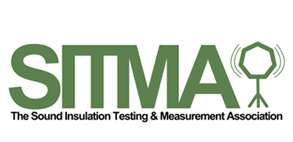Offices Nationwide

Sound Insulation
Two parameters are used to describe the sound insulation of a partition, Dw and Rw. Dw represents the sound insulation between rooms on-site. Since these figures describe the fnal site requirements, Dw levels are specified by clients and Building Regulations. Rw represents the lab tested sound insulation of an element making up a partition wall/floor type. Due to flanking and other factors, lab rated sound reduction levels will not be achieved on-site. Conventionally, there is a 5 to 10 dB reduction between a Rw lab tested figure and an on-site Dw figure. The conversion between Dw and Rw is relatively complex and takes into consideration receiver room volume, receiver room reverberation times and the area of the separating partition. The conversion between Rw and Dw should always be calculated.



The Decibel Scale
The decibel scale gives an approximation of human perception of relative loudness. This is because the human ear has a logarithmic response to changes in sound level.
On the decibel scale, the smallest audible sound (near total silence) is 0 dB. A sound ten times more powerful is 10 dB. A sound 100 times more powerful than near silence is 20 dB.
The logarithmic nature of the dB scale means that each 10 dB increase represents a 10-fold increase in acoustic power. A 20 dB increase is therefore a 100-fold increase in power, and a 30 dB increase is a 1000-fold increase. However, an increase in acoustic power of ten times does not mean that the sound is perceived as being ten times louder. The ear perceives a 10 dB increase in sound level as only a doubling of sound loudness, and a 10 dB decrease in sound level as a halving of sound loudness.
The lower threshold of human hearing is around 5 dB. Normally speaking voices are around 65 dB. A rock concert can be around 120 dB.
Sounds that are 85 dB or above can cause hearing damage, and the higher the sound pressure, the less time it takes to cause damage. For example, a sound of 85 dB may take 8 hours to cause damage, whereas a sound of 100 dB may start to cause damage after only 30 minutes. A sound of around 150 dB can cause instantaneous hearing damage.



How loud is too loud?
Continued exposure to noise above 85 dBA (adjusted decibels) over time will cause hearing loss. The volume (dBA) and the length of exposure to the sound will tell you how harmful the noise is.
In general, the louder the noise, the less time required before hearing loss will occur.



Noise Disturbance
Building acoustics can help to mitigate the effects of noise disturbance which can have negative effects on health, well-being and general quality of life.
The Noise Policy Statement for England (NPSE) defines noise pollution as:
- Environmental noise: which includes noise from transportation sources. - Neighbour noise: which includes noise from inside and outside buildings. - Neighbourhood noise: which includes noise arising from industrial and entertainment premises, trade and businesses, construction sites and noise in the street.
This can be an important consideration for the location, design and construction of new developments.


Copyright 2025 E2 Specialist Consultants Limited
Company No. 06728970

































